Top Rankings
Bynum Independent School District ranks among the top 20% of public school district in Texas for:
Category
Attribute
Overall Rank
Highest overall rank (Top 20%)
Math Proficiency
Highest math proficiency (Top 20%)
Reading/Language Arts Proficiency
Highest reading/language arts proficiency (Top 20%)
Science Proficiency
Highest science proficiency (Top 5%)
Student Attention
Lowest student:teacher ratio (Top 1%)
For the 2025 school year, there is 1 public school serving 184 students in Bynum Independent School District. This district's average testing ranking is 9/10, which is in the top 20% of public schools in Texas.
Public School in Bynum Independent School District have an average math proficiency score of 57% (versus the Texas public school average of 41%), and reading proficiency score of 62% (versus the 51% statewide average).
Minority enrollment is 43% of the student body (majority Hispanic), which is less than the Texas public school average of 75% (majority Hispanic).
Overview
This School District
This State (TX)
# Schools
1 School
9,320 Schools
# Students
184 Students
5,529,984 Students
# Teachers
21 Teachers
374,844 Teachers
Student : Teacher Ratio
9:1
9:1
District Rank
Bynum Independent School District, which is ranked #169 of all 1,196 school districts in Texas (based off of combined math and reading proficiency testing data) for the 2021-2022 school year.
The school district's graduation rate of 50% has decreased from 80% over five school years.
Overall District Rank
#164 out of 1204 school districts
(Top 20%)
(Top 20%)
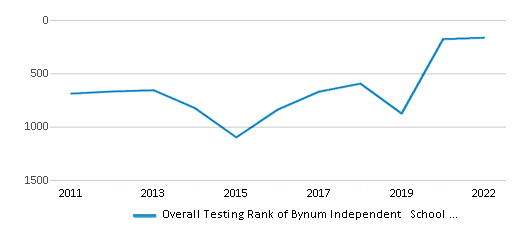
Math Test Scores (% Proficient)
55-59%
41%
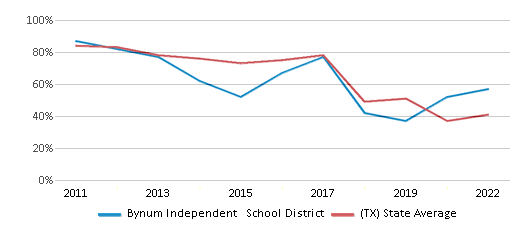
Reading/Language Arts Test Scores (% Proficient)
60-64%
51%
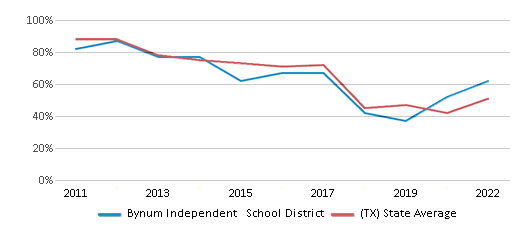
Science Test Scores (% Proficient)
70-79%
46%
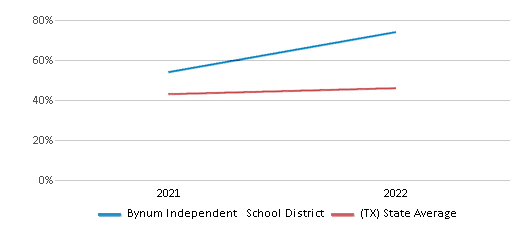
Graduation Rate
≥50%
90%
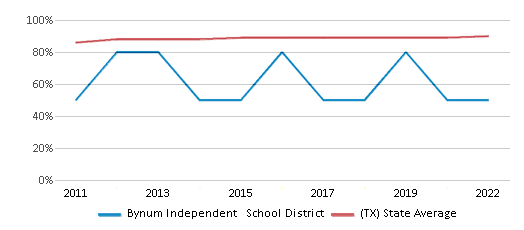
Students by Ethnicity:
Diversity Score
0.55
0.64
# American Indian Students
n/a
17,916 Students
% American Indian Students
n/a
n/a
# Asian Students
2 Students
296,049 Students
% Asian Students
1%
6%
# Hispanic Students
67 Students
2,942,422 Students
% Hispanic Students
37%
53%
# Black Students
4 Students
706,008 Students
% Black Students
2%
13%
# White Students
105 Students
1,384,941 Students
% White Students
57%
25%
# Hawaiian Students
n/a
8,841 Students
% Hawaiian Students
n/a
n/a
# Two or more races Students
6 Students
173,807 Students
% of Two or more races Students
3%
3%
Students by Grade:
# Students in PK Grade:
11
275,832
# Students in K Grade:
13
361,958
# Students in 1st Grade:
9
385,427
# Students in 2nd Grade:
12
402,148
# Students in 3rd Grade:
17
399,623
# Students in 4th Grade:
10
398,690
# Students in 5th Grade:
19
399,071
# Students in 6th Grade:
16
402,143
# Students in 7th Grade:
6
406,424
# Students in 8th Grade:
13
414,179
# Students in 9th Grade:
9
472,263
# Students in 10th Grade:
18
438,622
# Students in 11th Grade:
14
406,207
# Students in 12th Grade:
17
367,397
# Ungraded Students:
-
-
District Revenue and Spending
The revenue/student of $19,266 is higher than the state median of $13,387. The school district revenue/student has grown by 5% over four school years.
The school district's spending/student of $14,582 is higher than the state median of $14,116. The school district spending/student has grown by 5% over four school years.
Total Revenue
$4 MM
$74,029 MM
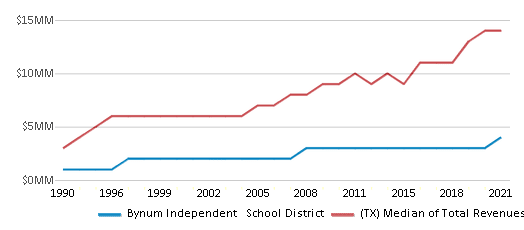
Spending
$3 MM
$78,063 MM
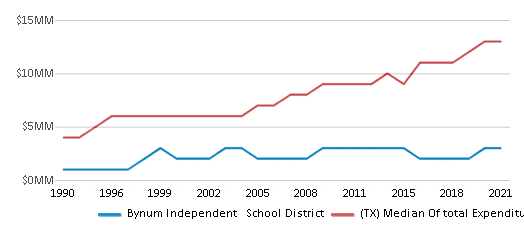
Revenue / Student
$19,266
$13,387
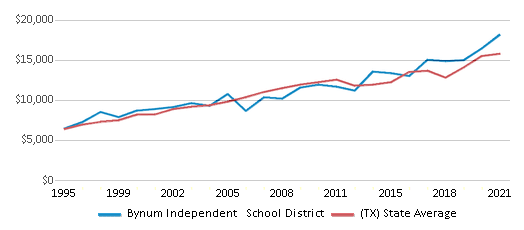
Spending / Student
$14,582
$14,116
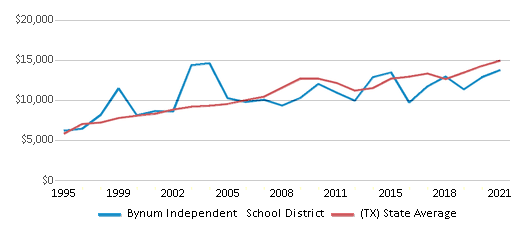
Best Bynum Independent School District Public Schools (2025)
School
(Math and Reading Proficiency)
(Math and Reading Proficiency)
Location
Grades
Students
Rank: #11.
Bynum School
(Math: 55-59% | Reading: 60-64%)
Rank:
Rank:
9/
Top 20%10
704 Toliver Ave
Bynum, TX 76631
(254) 531-2341
Bynum, TX 76631
(254) 531-2341
Grades: PK-12
| 184 students
Frequently Asked Questions
How many schools belong to Bynum Independent School District?
Bynum Independent School District manages 1 public schools serving 184 students.
What is the rank of Bynum Independent School District?
Bynum Independent School District is ranked #169 out of 1,196 school districts in Texas (top 20%) based off of combined math and reading proficiency testing data for the 2021-2022 school year. This district ranks in the top 20% of Texas school districts for: Highest overall rank (Top 20%), Highest math proficiency (Top 20%), Highest reading/language arts proficiency (Top 20%), Highest science proficiency (Top 5%) and Lowest student:teacher ratio (Top 1%)
What is the racial composition of students in Bynum Independent School District?
57% of Bynum Independent School District students are White, 37% of students are Hispanic, 3% of students are Two or more races, 2% of students are Black, and 1% of students are Asian.
What is the student/teacher ratio of Bynum Independent School District?
Bynum Independent School District has a student/teacher ratio of 9:1, which is lower than the Texas state average of 15:1.
What is Bynum Independent School District's spending/student ratio?
The school district's spending/student of $14,582 is higher than the state median of $14,116. The school district spending/student has grown by 5% over four school years.
Recent Articles

What Is A Charter School?
Explore the world of charter schools in this comprehensive guide. Learn about their history, how they operate, and the pros and cons of this educational innovation. Discover key facts about charter schools, including admission policies, demographics, and funding, as well as what to look for when considering a charter school for your child.

10 Reasons Why High School Sports Benefit Students
Discover the 10 compelling reasons why high school sports are beneficial for students. This comprehensive article explores how athletics enhance academic performance, foster personal growth, and develop crucial life skills. From improved fitness and time management to leadership development and community representation, learn why participating in high school sports can be a game-changer for students' overall success and well-being.

February 05, 2025
Understanding the U.S. Department of Education: Structure, Impact, and EvolutionWe explore how the Department of Education shapes American education, from its cabinet-level leadership to its impact on millions of students, written for general audiences seeking clarity on this vital institution.





